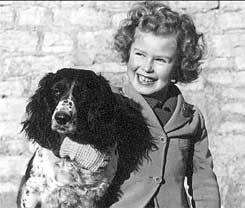|
|
 |
| |
Scars of warfare seen from a Cotswold idyll
A charming childhood memoir reveals what happened when soldiers come home to their families, writes Dan Carrier
Bertie, May and Mrs Fish: Country Memories of Wartime by Xandra Bingley HarperCollins, £14.99 order this book
THIS book is, at first glance, romantic. About a Cotswold childhood, its prose is from the same stable of Laurie Lee. Like Lee’s autobiography Cider With Rosie, author Xandra Bingley, a retired literary agent, makes the Cotswold countryside come alive.
She takes the gentle greens of a countryside traversed by age-old dry stone walls and the product is a butterfly-filled memoir of a little girl’s life on a hill farm.
But it has a dark underbelly: it is also about the tragedy of war.
It juxtaposes a gentle landscape, seen through the eyes of a little girl, with the horror of World War II. It is about the families left behind while men fought – and what happened to them when the fighting stopped and the bunting had been rolled up.
“I wrote this book because I wanted to honour my parents’ voices,” she says. Ms Bingley, who lives in Primrose Hill, is a retired literary agent. It means, she says, she knew there was a place on book shops’ shelves for her memoirs.
“There was a story that had yet to be told: the story of the aftermath. Do the politicians consider the lasting effects being a soldier has on people? I do not think they do – because if they did, they would never agree to send troops to fight.
“I also wanted to relive the life of my mother. Posh girls did proper work during the war. She was up every day at 5am. It was a tough life.”
She does so, using evocative passages: even a description of drinking tea will make you thirsty: “He unbuckles his canvas knapsack and unscrews the white bakelite lid off a green thermos and pours black tea and tips milk and sugar out of two screw top jam jars and stirs with a penknife.”
Xandra’s mother May was from well-to-do Anglo-Irish stock and when her husband Bertie Bingley found a deserted Elizabethan farmhouse hidden on Gloucestershire hills, her family’s fortunes paid for the spread.
“My father found it while he was on manoeuvres in 1941, and was captivated,” says Xandra.
Once the deeds were signed, he left to resume training with his regiment – leaving his wife to manage 2,000 acres alone. Her response to the challenge was to get on with it – or, as Bertie put it, “not be a windy bugger”. She wasn’t – and that is one of the problems they later encounter as her husband returns to find his wife has managed well without him.
Bertie reveals himself to be a less than perfect husband. Apart from landing his wife with the challenge of managing such a large farm with its herds, crops and land girls who find it impossible not to get pregnant by the Yankee soldiers billeted nearby, an anonymous phone call informs May that Bertie, cryptically, is not behaving “how a husband should”.
She tells him the choice is his: if he doesn’t want a marriage, he only has to say so.
He takes offence and warns her not to take phone calls of that nature.There is no explanation or apology, just a thinly veiled threat.
Away from affairs of the heart, Xandra brings out the harshness of countryside living.
“It was not an easy life,” she explains.
“We had a windmill pumping our water and lighting was paraffin lamps.”
Xandra writes in a matter-of-fact style, explaining how a farm hand lost his fingers using a circular saw was an every day occurrence. She mentions it like she would mention the weather.
Add to this the dog who loses its legs when he has a run-in with a hay cutter, and the thrills and spills of the hunting set and you get a picture of her world.
When May died her injuries were catalogued: “Two broken wrists, three ribs, two collarbones, one arm, one ankle, one knee and a fractured skull.” All were from riding.
There is a mark of English upper class eccentricity through out: entertaining characters pop out of cowsheds and jump over hedges on horses. Xandra recalls them in detail and has an ear that remembers how they sounded.
Her father’s amazing use of language stands out. He says: “Shall we reward ourselves with a sumptuous mixture of Mr Bournville’s chocolate powder lightly stirred into the beloved Baroness’s fresh milk... what say?”
And he makes numerous observations, including: “The day the Almighty created sheep He was in poor form.”
But when Bertie returns in 1945, he is a broken man.
The stiff upper lip has wobbled and he is suffering from post-traumatic stress.
He sleep walks and shouts at planes that fly over him. When he led a unit on to the D-Day beaches, they had been hit by friendly fire and American planes killed his comrades.
Nothing but a punch would shake him out of his night time delirium.
But the flip side of this is how one woman’s determination got her through troubled times.
May, who never went to school and was brought up to play music and tennis and go to balls, suddenly found herself waking before dawn to run a farm.
For Xandra Bingley to have captured her mother’s response to this life makes this an interesting memoir and written so it gallops along like one of her hunting horses. |
|
|
|
 |
|


